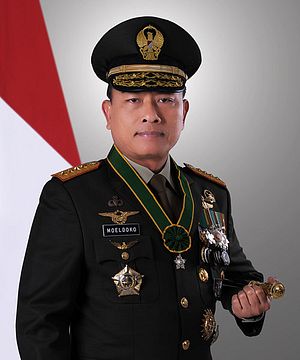The Indonesian military is keen on playing the role of “big brother” within the Association of Southeast Asian Nations (ASEAN) and beyond to promote order in the Asia-Pacific, the head of the country’s armed forces (TNI), General Moeldoko, said yesterday.
In remarks delivered before officially opening a meeting of senior Indonesian military leaders, Moeldoko said that he had used Indonesia’s rising power and influence in various regional fora such as the ASEAN Chiefs of Defense Forces Informal Meeting (ACDFIM) to advance the military’s goal of making itself a “big brother” in Southeast Asia.
“As head of TNI, I have brought a strong mission for it [the Indonesian military] to be the ‘big brother’ in the ASEAN region. We are now trying to do this and everyone [in ASEAN] has recognized the military’s growing power,” Moeldoko said in his remarks, which were delivered in the country’s military headquarters in East Jakarta in the local language Bahasa Indonesia.
Indonesia’s “big brother” role – a more informal characterization of its status as first among equals in ASEAN given its heft – tends to be viewed with mixed feelings in Southeast Asia. Some see Jakarta’s leadership as useful in directing the region and logical given its weight, while others regard it with suspicion due to historical animosities and future worries about how Indonesia may use its growing power. That lingering suspicion has only been compounded by some uncertainty about the new Indonesian president Joko “Jokowi” Widodo’s foreign policy and what it means for Jakarta’s role in the region.
Nevertheless, Moeldoko said that with Indonesia’s growing might and status being widely recognized within ASEAN, the Indonesian military was now seeking similar recognition in the broader Asia-Pacific region.
Moeldoko’s focus on the expansion of Indonesia’s role into the broader Asia-Pacific is consistent with his previous remarks on the subject. For instance, in March this year, Moeldoko told the Singapore newspaper The Straits Times in an interview that he had proposed that the ACDFIM be expanded into an “ACDFIM Plus” to include counterparts from key players like the United States and China to better manage regional tensions in the Asia-Pacific.
Looking ahead, Moeldoko said that beyond the Indonesian military’s quest for “big brother” status within ASEAN, there would be other challenges for Indonesia and other ASEAN states as the Asia-Pacific becomes a region of focus in the 21st century and emerges as a global center of economic gravity.
One of those challenges that ASEAN states are grappling with now, and which Moeldoko addressed, is the South China Sea issue. Moeldoko revealed that he had told the chief of the Chinese armed forces in recent talks that while he and his ASEAN counterparts understood China’s ongoing military modernization, they “could not accept” if its growing prowess gives rise to instability in Southeast Asia.
While Moeldoko emphasized he was only conveying a message from ASEAN military chiefs, he is also known to personally harbor a more hawkish view of China. In April, Moeldoko advanced a hardened Indonesian position on the South China Sea in the Wall Street Journal, noting that Jakarta was “dismayed” that Beijing’s infamous nine-dash line in the South China Sea had included “parts of the Natuna Islands” which Indonesia claims, and that his country would “strengthen its forces” in response. The piece stoked broader concerns not just about a potential change in Indonesia’s approach to the South China issue, but the extent to which its position was truly coordinated between different interest groups including the military.
However, in his remarks on Monday, Moeldoko also reiterated that Indonesia was looking to cooperate with China on several matters as well, for instance in exploiting potential synergies between the “global maritime fulcrum” doctrine that Jokowi has advocated and the Maritime Silk Road idea that China has advanced. Chinese and Indonesian officials and advisers have been emphasizing the compatibility of these two visions since Jokowi was inaugurated in October.
































